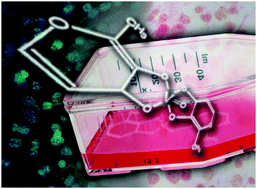Speciation studies of vanadium in human liver (HepG2) cells after in vitro exposure to bis(maltolato)oxovanadium(iv) using HPLC online with elemental and molecular mass spectrometry†
Abstract
A large number of studies has been published proposing a range of vanadium containing compounds as potential new anti-diabetic drugs due to the observed insulin mimetic function of V(IV) complexes. Vanadium uptake and distribution within the body have been investigated in animal models by determination of total vanadium concentrations. Phase I and phase IIa human clinical trials have been completed with the ethyl analogue of bis(maltolato)oxovanadium(IV) (BMOV). Mass spectrometry studies have focused on the characterisation of vanadium transferrin in body fluids after incubation with BMOV. However, the application of hyphenated mass spectrometric techniques for the identification of low molecular mass mediating vanadium metabolites in human body fluids or tissues after exposure to BMOV or in more simplified and cheaper models such as in vitro diabetes models has not been reported yet. This paper describes for the first time methodology for the characterisation of the predominant anionic vanadium metabolite in a liver cell model after exposure to BMOV. Total vanadium determination in cell lysates indicated significant uptake of vanadium. Size exclusion chromatography was applied with combined elemental and molecular mass spectrometric detection for vanadium speciation analysis in the cell lysates. The effect of cell medium and lysis conditions on the observed vanadium metabolites was studied. For the first time stable isotope labelling was applied to BMOV in order to achieve unambiguous correlation between elemental and molecular mass spectrometric results. Candidate elemental formulae for the unknown metabolite were derived based on accurate mass measurements. The most likely candidate formula combined with MS/MS fragmentation data is consistent with the presence of a divanadate-phosphate derivate.


 Please wait while we load your content...
Please wait while we load your content...